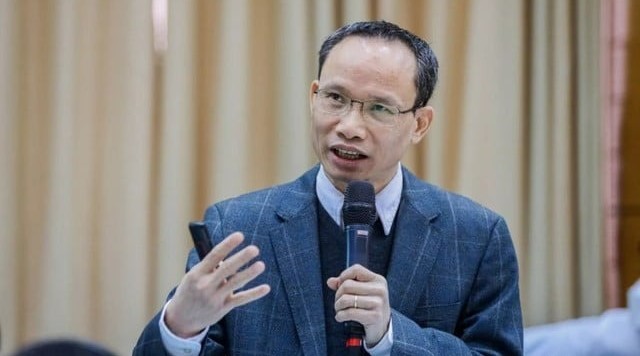Vietnam’s 2024 economic outlook through lens of experts
Vietnamese economists have given their forecasts on the country’s economic outlook in 2024, with opportunities intertwined with difficulties and challenges.
Dr. Can Van Luc, BIDV bank chief economist
Vietnam’s GDP many increase 7-7.5% in 2024

Dr. Can Van Luc, chief economist at Hanoi-based BIDV bank. Photo by The Investor/Trong Hieu.
The 2024 world economy is forecast to see little improvement (going flat or slightly decreasing) compared to 2023 as difficulties and challenges still exist, particularly high inflation and interest rates.
Recent monetary policy tightening has increased financial and monetary risks, while investment and consumption have recovered slowly. The World Trade Organization (WTO) in December 2023 said global trade in 2024 is forecast to continue being uncertain and may only grow by 3.3-3.6% after a slight increase of 0.8% in 2023.
The recovery momentum of foreign direct investment (FDI) activities will remain slow, especially when most countries apply a global minimum tax of 15%, and consumer demand remains weak, particularly in the EU, Japanese and Chinese markets.
International organizations such as the International Monetary Fund (IMF), the World Bank (WB) and the Organization for Economic Cooperation and Development (OECD) have all lowered their global economic growth outlooks for 2024 to 2.4-2.9%, lower than 2023 (3%). The positive point is that interest rates will decrease as global inflation continues to slide (down to about 3.5% from 5.5% in 2023), thereby stimulating investment and consumption.
For Vietnam, the domestic macro economy is forecast to see both advantages and difficulties in 2024. The main advantages from 2023 will continue. However, Vietnam's economy faces many difficulties and challenges, including risks and challenges from lingering international difficulties; slow recovery of growth drivers such as exports, consumption, industrial production and private investment; growth quality yet to improve; struggling business activities; slow credit growth; a significant fall in 2023 state budget revenue; slow restructuring of the economy and weak businesses; slow issuance of mechanisms for new growth drivers and stagnant public service performance due to the fear of mistakes and responsibility; corporate bond, real estate and gold markets still posing many risks.
In such international and domestic contexts, with the recovery momentum and more drastic efforts of the government, people and businesses, it is projected that Vietnam's economy in 2024 can achieve higher growth than last year. In the base scenario, Vietnam's GDP growth in 2024 could reach 6-6.5%. In a positive scenario, the figure could be 0.5-1% percentage point higher than the base scenario, while the negative scenario estimates it at 5-5.5%.
Dr. Tran Dinh Thien, former director of Vietnam Institute of Economics.
High quality workforce and institutional reform are the keys

Dr. Tran Dinh Thien, former director of the Vietnam Institute of Economics. Photo courtesy of VietNamNet.
In 2024, in general, the world situation will still face difficulties because the basic conditions to ensure stability are unclear, including continuing geopolitical conflicts and higher instability. It can be said that we are still in a gloomy decade, with high interest rates, high inflation and cash flow difficulties. The world economy lacks good drivers for growth. As a hope for the world economy this year, the new technological era will become stronger, but the opportunities are not yet clear.
The regional and world contexts have strong impacts on Vietnam because our economy is highly open and relies heavily on the banking system, lacking basic advantages for GDP growth in 2024. However, that does not mean that in a difficult world, Vietnam does not have opportunities. There are still "side doors" for Vietnam. If the country can take advantage of the opportunities, it can become an "oasis" and a bright spot in global investment and trade. This ray of hope has been rekindled since 2023 and needs to be further strengthened in 2024.
In 2024-2025, there will be many problems facing Vietnam. Overall, we have been able to withstand the difficulties. Although it is still very difficult, the opportunities to recover and rise up are great. The current economy can be compared to a "snake shedding its skin", completing the opportunity for change, but to be strong, it has to make more efforts.
However, there are also advantages. Firstly, we can still maintain the growth pace. Even though it is weak in somewhere, the economy is still resilient. This is very important because it creates trust and motivation to support growth.
Secondly, 2023 marked a turning point in attracting foreign investment in Vietnam. The world chose Vietnam, foreign investment flows grew strongly, and macroeconomic balances continued to be stable. Not only increasing in scale, foreign investment flows were restructured and met Vietnam’s requirements, with good investors and projects using high, green technology toward sustainability.
Thirdly, in 2023, we did quite well in developing transport infrastructure. This will be one of the important factors to promote private investment and attract foreign investment. However, our soft infrastructure such as technology and labor capacity is still weak. If it is not promptly improved in the next few years, it will greatly affect the investment environment. It can be said that human resource training is a vital challenge in the fierce battle to gain advantages in attracting large, high-tech projects.
The final advantage is institutional infrastructure. We cannot repeatedly amend policies but the important thing is to change the method so that institutional reform truly targets business support, transparency and openness. That is an essential requirement for integration.
Dr. Vo Tri Thanh, director of Institute for Brand and Competitiveness Strategy
Prioritizing troika of investment, consumption and export

Dr. Vo Tri Thanh, director of the Institute for Brand and Competitiveness Strategy. Photo courtesy of Dau tu (Investment) newspaper.
In the fourth quarter of 2023, Vietnam's economy grew by 6.72%, accelerating rapidly from 5.47% in the third quarter and 4.25% in the second quarter. This shows that the economy has maintained a positive growth rate compared to the regional and world averages. Many international organizations have forecast that Vietnam will achieve a growth rate of more than 5.7-6.5% in 2024. This number is certainly based on solid foundations which are thorough and detailed analyses.
To promote economic growth in 2024, the government has directed prioritizing the "troika" - the three traditional growth drivers of investment, consumption and export. Among them, export growth will tend to slow down due to falling world demand. Private investment has recently grown more clearly but is not strong enough. Although public investment is being promoted, it will take time for measures to prove effective. Domestic consumption is an important driving force in 2024 and remains the driving force for economic growth in the medium and long term.
To help businesses conquer the domestic market, the government needs to further promote public investment activities and continue to implement policies to support the economy's purchasing power through fiscal policies such as tax reduction and a base salary increase. Measures should be taken to balance supply and demand and stabilize the market, contributing to controlling inflation and ensuring social security; stimulating demand and promoting consumption of domestic goods through the program "Vietnamese people use Vietnamese goods"; and boosting regional connectivity.




